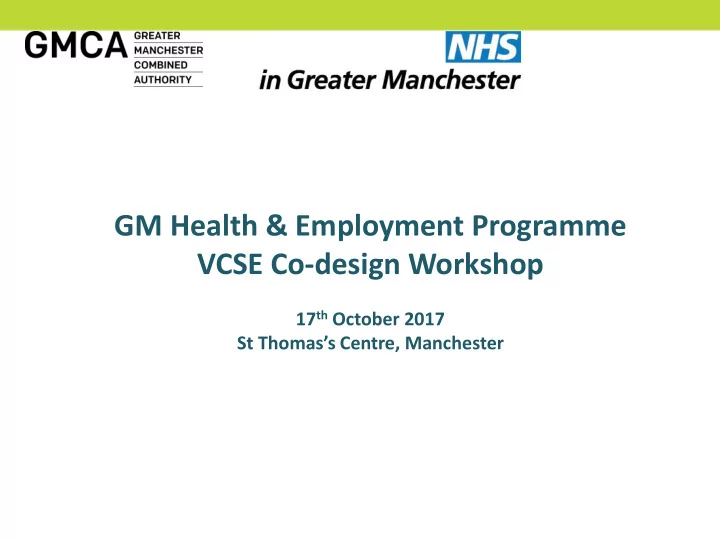

GM Health & Employment Programme VCSE Co-design Workshop 17 th October 2017 St Thomas’s Centre, Manchester
Workshop Agenda Time Item Lead 14.00 Arrival 14.15 Welcome and Introductions Michele Scattergood, Chief Executive, Breakthrough UK 14.20 GM Working Well Early Help Service - why do we need it and what Jenny Osborne, Health & might it look like? Employment Lead, GMHSCP 14.35 Discussion 1: Barriers to remaining in employment Facilitators 15.05 Discussion 2: What ’s already happening in GM and what works Facilitators 15.30 Break 15.45 Discussion 3 (two groups): Facilitators • Those who provide employment support • Those who provide more general health and wellbeing support 16.15 Summary of key points and next steps Michele Scattergood 16.30 Close | 1
What happens after Payment Model What outcomes triage for those who might we want are not eligible for to see? the service? Referral Bio- -GP/Primary Feedback to Triage into psychosocial Care referrer Case health & Assessment, Practitioner employment action plan and Job retention closure -Self-referral support case support -Jobcentre Plus management -Employer Referral LCO /place-based interface Components of the service Who is eligible? How far do we define How do we phase -SMEs/Self-employed the components of the testing of this -How long off work? the service? service? - Live/work in GM
Workstreams and timelines 1. Project management and governance Project Programme Project team documentation Board in place finalised approval 2. Stakeholder engagement & Communications Stakeholder Finalise areas Locality engagement to test the development sessions service 3. Detailed Model design Specification Co-design workshops complete 4. Evaluation, CBA, Information governance & Data Literature Evaluation review plan complete complete 5. Investment, procurement & sustainability Options appraisal for Transformation & 6. Project funding / procurement Reform and Procurement process implementation mechanism Investment fund bid 2021/2022
Workshop discussions Discussion 1 (whole group) Barriers to remaining in work Our evidence suggests that the main conditions which affect people’s ability to remain in work are mental health and musculoskeletal conditions (or both) • In your experience, what are the main health conditions make work/employment difficult? • Why is that; is it the condition itself of the associated factors? (Such as attitudes of management/others, flexibility of working hours, ability to travel etc.) Delivery Model Our evidence suggests that those individuals/ employees who experience poor mental or physical health will have a range of challenges and barriers to remaining in work. • What key things/features would a service need to have in place in order to help people remain in employment, or get work after falling out of employment • Our research suggests an optimum support period of 10- 12 weeks. What are your thoughts on this? | 7
Discussion 2 (whole group) We are very aware that there are many (often smaller) organisations within GM that are already supporting people to stay in work, both directly and indirectly. We want to understand what works and we want to ensure anything we introduce fits within the GM context. • What service models / support approaches do you know support are you aware of in GM that helps people with a health condition remain in employment? (either directly or indirectly) • Any of these in GM? • How would you come into contact with people who are at risk of losing employment or who have very recently lost employment due to a health condition? | 8
Discussion 3 (separate groups) Group 1: Organisations which provide employment support • Our initial thinking is that the programme would be delivered in all GM boroughs and the service would be procured. • What considerations should we have as commissioners for the geography of the service delivery? • Other Working Well programmes have a strong emphasis on integration, including a network of Local Leads and ask and offers, to create an eco-system of support. Would that be beneficial for this programme and if so what would you expect to see included? • From your point of view, what do we need to think about when commissioning this service to ensure it can work well with support already available in localities? | 9
Group 2: organisations who provide services that support people to keep well/ healthy more generally and help remove some of barriers that exacerbate their health conditions or indeed create them in the first place Our current thinking is that this service will be aimed at SMEs and self-employed individuals; smaller organisations which are unlikely to have any formal occupational health provision. In order to ensure the service is useful to employers as well as employees, we need to understand the main challenges employers face in supporting employees with health conditions. • In your experience what type of support helps people to stay in work with a health condition (Formal or informal – e.g. Occupational Health or EAP, supportive mangers / colleagues, peer support, GP or other clinical support and/or advice.) • Have you experienced any challenges in managing people within you organisation who have an impairment or health condition? If so, what made this challenging? • How do you support people in your organisation who have a health condition (e.g. access to occupational health support, flexible working, health checks, peer support schemes) • Would you like to have access to a service like the one proposed, why/why not? | 10
Recommend
More recommend